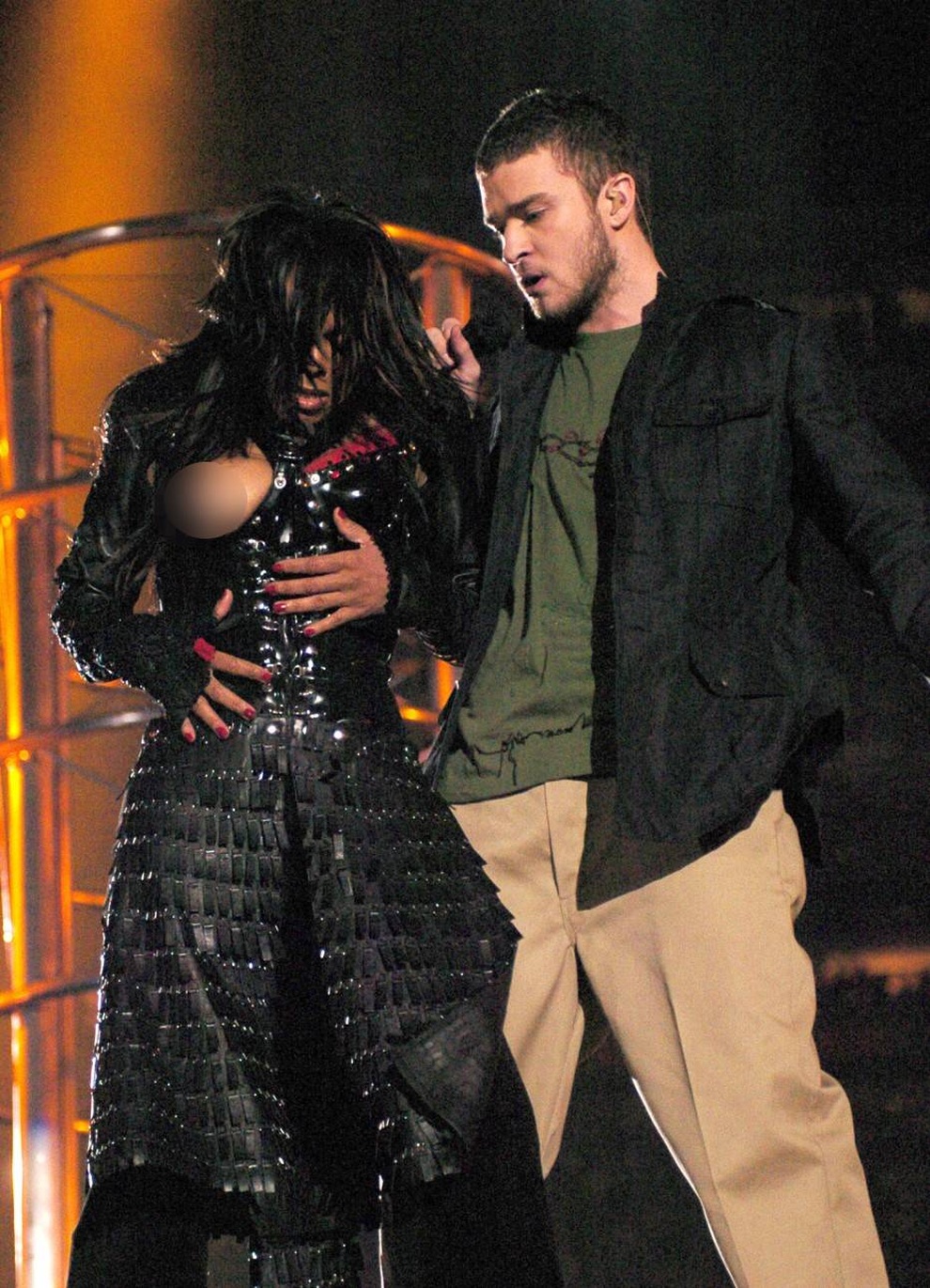It was Justin’s fault.

By Alex Cranz
In 2024, you can go onto YouTube, one of the most popular media distributors in the United States and the world, and you can pull up Janet Jackson’s 2004 performance at the Super Bowl. There are videos with her whole 11-minute performance and others that show only the three seconds that shook the country. Justin Timberlake, standing to Jackson’s left and singing “better have you naked / by the end of this song” from his song “Rock Your Body,” reaches across her body, grabs her garment, and yanks. A “wardrobe malfunction” ensues, and instead of revealing a pretty red bra, you — for not even a full second — see her nearly bare breast, a star-shaped shield obscuring most of her nipple.
Twitter and Facebook and the feed-driven news cycle didn’t exist when Nipplegate happened. In 2004, the internet was spread out among insular forums, Usenet groups, and nascent social media platforms like Livejournal and Myspace. There were no online spaces for the mainstream public to get together and collectively freak out. So, instead of processing the moment together online, people processed it the old-fashioned way, maybe for the last time: in sound bites on the news, quotes in the paper, and a record number of complaints to the FCC.
Michael Powell, then head of the FCC, called the moment a “classless, crass and deplorable stunt” and announced an investigation. CBS, which had broadcast the offending mammary, banned Janet Jackson’s music and punted her from the Grammy Awards lineup (though Timberlake, absurdly enough, was still allowed to perform). CBS also forbade MTV, which had produced the show, from producing all future halftime shows.
It got internet-level weird, too, and fast. People questioned whether Janet Jackson‘s nipple was meant to distract us all from the controversial Iraq War. Others noted that then-embattled President George Bush was using the moment to rail against moral failures instead of improving his historically awful approval numbers. (He’d go on to be reelected that year.) Disney even removed a statue of Jackson from one of its theme parks.
The discourse around accidental nudity has changed quite a bit since 2004, and yes, a lot of that is down to changing standards on nudity and a diminishment of powerful voices in censorship like the Parents Television and Media Council. But it also began to shift because the way we watched TV was about to change forever.
Phones were awful at video back then. The internet was still more for horny weirdos and college students (I was both) than the wider public. There was no convenient and fast way to spread videos unless you were torrenting. Even the iconic photos from that year’s Super Bowl — which highlight Janet Jackson’s clear shock in the moment — were harder to share online.

Jawed Karim, a PayPal employee at the time, missed the halftime show and thus missed the only thing anyone wanted to talk about. He couldn’t find it online, either. He’d been kicking around startup ideas with his friends Steve Chen and Chad Hurley, and the three decided that moments like this one would need a place to be cataloged and searchable on the internet. A few days later, they started working on an online video platform called YouTube.
Did Janet Jackson’s nipple create YouTube and the streaming, online, on-demand, virality-fueled future of media all by its shielded self? Maybe not exactly. But it certainly helped usher in new platforms and new ways for people to relive these culture-shaking moments together. Now, two decades later, broadcast TV is nearly dead, and the streaming services meant to replace it are battling YouTube, which conquered the internet and is now looking to conquer TV, too.

And it’s not just how TV has changed. People share big moments differently now, too. Images and videos are no longer held back by bandwidth and are often available seconds after incidents occur. Conversations are no longer limited to forums and the comment sections of your favorite blog. They’re on Threads and Instagram, where nipples aren’t allowed but invective is, and on X, where both nipples and invective are allowed and encouraged. People process big events in remixes and memes on TikTok and in cringeworthy posts with AI-generated art on Facebook. Everything happens so fast, and in such large numbers, that something like a nip rip doesn’t feel as momentous as it once did.
And because that content is shared on the internet instead of on broadcast TV, there are no governing standards. You don’t write to the FCC anymore. You complain about an exposed nipple on YouTube. You put a comment on the video — maybe report it to Google. The platforms might care, or they might not. But there will be other nipples. Sports get broadcast on a delay to prevent things like the wardrobe malfunction from happening, but the internet moves too fast.
Even the FCC has evolved since those days, for that matter. Powell, the former commissioner, told ESPN in 2014 that he thought it was “really unfair” that Jackson, and not Timberlake, was the recipient of all the wardrobe malfunction blowback. “In reality, if you slow the thing down, it’s Justin ripping off her breastplate.” He also said that the idea of the FCC protecting you from harmful images on your television was already over, thanks to the internet. “I just think that’s probably a bygone era.”
The great irony of Nipplegate, and maybe its true legacy, is that something like it would be able to travel much faster and wider now — and yet in large part because of what happened on that stage in 2004, because of the change it wrought both technologically and culturally, it wouldn’t be nearly as big a deal. After all, it’s just a nipple.





